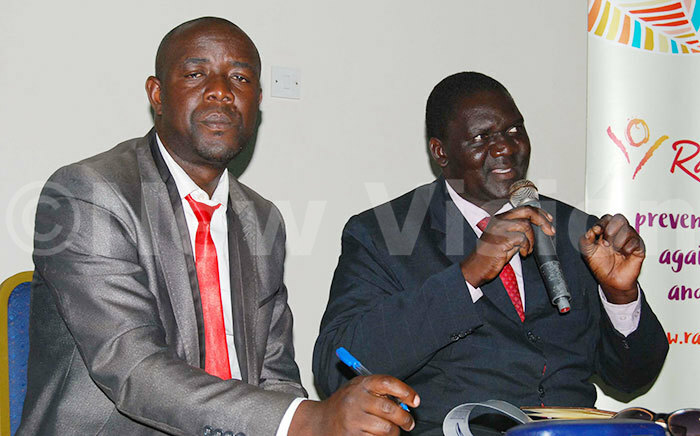Increase capitation grant-School heads
May 17, 2018
“It is my humble request to the Government increases the capitation grant because the prices of goods needed by pupils have risen since the start of the Universal Primary Education (UPE).”

PIC: Violence against children prevention coordinator, Raising voices, Katharina Anton addressing the congregation during the raising voices commemoration of global Action week in education at Metropole Hotel Kampala.(Credit: Godiver Asege)
GRANTS
KAMPALA - Primary school head teachers have asked the Government to increase its capitation grant to primary schools.
They argued that the current sh2000 paid per pupil every term is not enough to fund the schools' different activities such as buying scholastic materials and paying bills.
"It is my humble request to the Government increases the capitation grant because the prices of goods needed by pupils have risen since the start of the Universal Primary Education (UPE)," said Charles Mwebaze, the head teacher Kiko Primary School in Kabarole district.
Mwebaze said this during the education stakeholders meeting organised by Raising Voices, a Non-Governmental organisation. The meeting took place at Metropole Hotel in Kampala.
"Once the grants are increased, our pupils can get quality education that prepares them to fit in the present and future through providing them with personal literacy and other skills," said Rev. Erick Sebigaju, the head teacher Bwizibwera Primary, Church of Uganda Primary School in Luwero.
The Government introduced UPE in 1997 and has been paying sh7000 for every child, each year as capitation grant to its aided public schools.

Head teacher Ayile primary school, Musa Moses Owiny (R) addressing the congregation during the Raising voices commemoration of the global Action week in education , while the Head teacher Bukuuku primary school Bright Robert looks on .(Credit: Godiver Asege)
The Capitation Grants are computed based on school enrollment, with each pupil getting over sh7000 a year in addition to a block grant of sh100000 per term.
According to the Capitation Grants expenditure guidelines, 50% of the grant is supposed to be used on instructional materials; 30% on co-curricular activities.
The guideline further notes that 15% is spent on school management, maintenance, payment for utilities such as water and electricity, whereas 5% on school administration. The funds are released on a quarterly basis in any given financial year.
Sebigaju said limited funding has affected the quality of education attained by school children, saying there are scenarios where pupils are able to read but cannot understand. He said self esteem is also lacking among most children.
Katharina Anton, the coordinator prevention of violence against children at Raising Voices explained that there have been considerable gains in education enrollment for mthe past 15 years.
She however, noted that, although an increased numbers of children are going to school, they don't acquire basic skills and alot more need to be done by stakeholders including Government to ensure quality education.
What Government says
Angella Nakafero, the gender technical adviser in the education ministry said the Government has always ensured presence of infrastructure such as class rooms, teachers' houses, and provision of safe water among others.
"Parents should also play their part as far as providing quality learning process is concerned," she stated.
On capitation grant increment, Nakafero explained that the discussions are going on between education ministry, finance and other agencies of Government over the issue.
